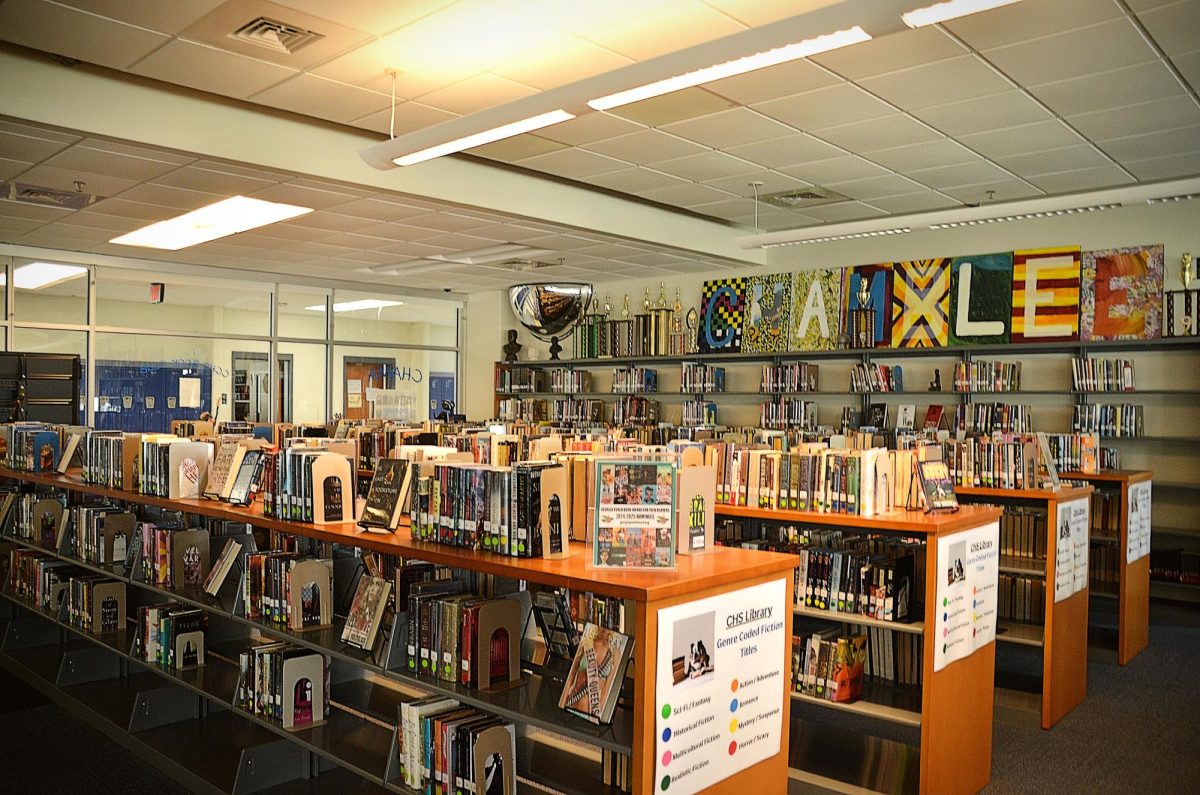Does anyone read anymore? As technology has become increasingly prevalent, reading for pleasure has been widely replaced by online activities, such as using social media and playing video games. According to Harvard Medical School, these activities provide users with easy, temporary dopamine boosts, unlike reading, which takes more effort but provides more stimulating benefits for the brain.
A study by the Pew Research Center reported that many teenagers believe that they spend too much time on their phones, and many are unsure about how to reduce their screen time. At Chamblee, some students have found that the new county-wide phone ban has decreased their screentime and given them opportunities to read during the school day. Some students look for a bright side to the phone ban that is highly unpopular among their peers.
“Back when I was younger, I used to be a very big reader. But in middle school, I [began reading less],” said Mysha Singapuri (‘28). “Now, because of the phone ban, I’m a big reader again.”
However, phones are not the only thing taking away from students’ potential reading time. Kiran Richardson (‘28) said that school work and extracurriculars leave her with little time to read for fun.
“In the past couple of years, I haven’t had as much time to [read],” said Richardson. “I play two separate instruments for marching band and concert season. It takes up a lot of time.”
Besides having a lack of time to read, some students said that there are other obstacles that they must overcome when reading.
“I have dyslexia, so it’s hard to read, especially longer books… It’s very time-consuming,” said Gaia Ben-Yoar (‘27).
Dani Singapuri (‘26) said that he enjoys reading, but he agreed that the initial hurdle of getting into a book usually stops him from sitting down to read more often.
“I think it’s a nice little break from the blue light [of a screen],” said Dani Singapuri. “But the reason I don’t [read more often] is just [struggling to get] into the whole mood of wanting to read… It takes a lot of mental effort.”
The tendency among today’s students to prefer using their phones over reading books has had a significant impact on their academic performance. School systems across the country have seen declining literacy rates among students according to Nation’s Report Card. Many teachers who have noticed this shift have expressed concern regarding the decreased reading comprehension in students. Dr. James Demer, an AP English Language and American Literature teacher at Chamblee, acknowledged this troubling trend but said that the worry is largely overblown.
“I’m not as freaked out as I’m supposed to be about young people not reading,” said Dr. Demer. “I do see that [Chamblee students] are good readers… I think young people are still reading, and older people are always alarmed about what young people are doing.”
So, students today are still able to read, but do they want to? Would they choose to read in their free time? Dr. Demer highlighted some potential reasons why students may decide to pick up their phones instead of a book.
“Reading is not passive. You have to engage…, and it’s also a skill that takes a really long time to get good at… I’m a good reader now, but only because I’ve been [reading] for so long and I do it so relentlessly, daily, just like anything else that you want to get good at,” said Dr. Demer. “But we don’t think of reading as a skill in the same way we think of playing guitar or baking a cake.”
For many people, it is clear that reading takes much time and energy. Dr. Demer stressed the necessity of pushing past these hurdles and incorporating more reading, both fiction and nonfiction, into one’s life.
“I think this is really important [to read] because you can’t be an intelligent person in the world if you don’t read,” said Dr. Demer. “I often say to my students, ‘You’ll be dumb all your life if you don’t read.’ We don’t have the time or the ability to investigate everything that’s going on all by ourselves; we have to read about it.”
Making a habit of reading can be very difficult to implement, but it can yield rewarding results. Dr. Demer believes that reading can lead people to be more willing to accept new concepts and ideas which he believes are important qualities of a successful student.
“Opening your mind to new ideas will make you a more productive, empathetic, and interesting person,” said Dr. Demer. “Your mind will become more nimble.”
Almost everyone reads daily; it comes so naturally, which means that many people may overlook the important role it plays in their lives. Nowadays, it has become the norm for people to pick up their phones whenever boredom strikes. Ben-Yoar mentioned some benefits she has enjoyed as she has made the effort to read more.
“[Since beginning to read more,] I’ve been seeing changes in myself, and I’ve definitely been happier,” said Ben-Yoar. “Choosing to read a book is so much better than being on my phone, and I’ve realized that my phone is actually really boring; I don’t need to be on it.”















Delphi • Oct 1, 2025 at 3:20 pm
i like reading ☺️